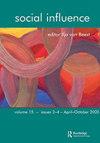关于间接排斥。考察观察者对目标的反应的中介和排斥的来源
IF 0.6
3区 心理学
Q3 PSYCHOLOGY, SOCIAL
引用次数: 11
摘要
被排斥是一种痛苦的经历,甚至连观察到被排斥都是痛苦的。我们通过调查观察者随后的行为以及这是否由个人感受(需求满足)和/或人际印象驱动来扩展替代性排斥的研究。66名参与者在赛博球中被排斥或被包容。他们报告了他们对资源和目标的总体印象,他们自己的需求满足程度,以及他们如何将资金分配给资源和目标。观察到排斥增加了对目标的捐款(减少了对来源的捐款),这是由需求满意度降低和对来源的负面印象共同介导的,后者的作用更强。这些发现促进了对替代性排斥后人际行为机制的认识。本文章由计算机程序翻译,如有差异,请以英文原文为准。
On vicarious ostracism. Examining the mediators of observers’ reactions towards the target and the sources of ostracism
Abstract Ostracism is a painful experience, to the point that even observing ostracism hurts. We extend research on vicarious ostracism by investigating how observers subsequently behave and whether this is driven by intrapersonal feelings (need satisfaction) and/or interpersonal impressions. Sixty-six participants observed either ostracism or inclusion in Cyberball. They reported their global impression of sources and of targets, their own need satisfaction, and how they wanted to allocate money towards sources and targets. Observing ostracism increased money donations to targets (and decreased donation to sources), which was mediated by both lowered need satisfaction and negative impressions towards the sources, with stronger effect emerging for the latter mediator. These findings advance knowledge about the mechanisms underlying interpersonal behavior after vicarious ostracism.
求助全文
通过发布文献求助,成功后即可免费获取论文全文。
去求助
来源期刊

Social Influence
PSYCHOLOGY, SOCIAL-
CiteScore
1.50
自引率
0.00%
发文量
4
期刊介绍:
Social Influence is a journal that provides an integrated focus for research into this important, dynamic, and multi-disciplinary field. Topics covered include: conformity, norms, social influence tactics such as norm of reciprocity, authority, scarcity, interpersonal influence, persuasion, power, advertising, mass media effects, political persuasion, propaganda, comparative influence, compliance, minority influence, influence in groups, cultic influence, social movements, social contagions, rumors, resistance to influence, influence across cultures, and the history of influence research.
 求助内容:
求助内容: 应助结果提醒方式:
应助结果提醒方式:


